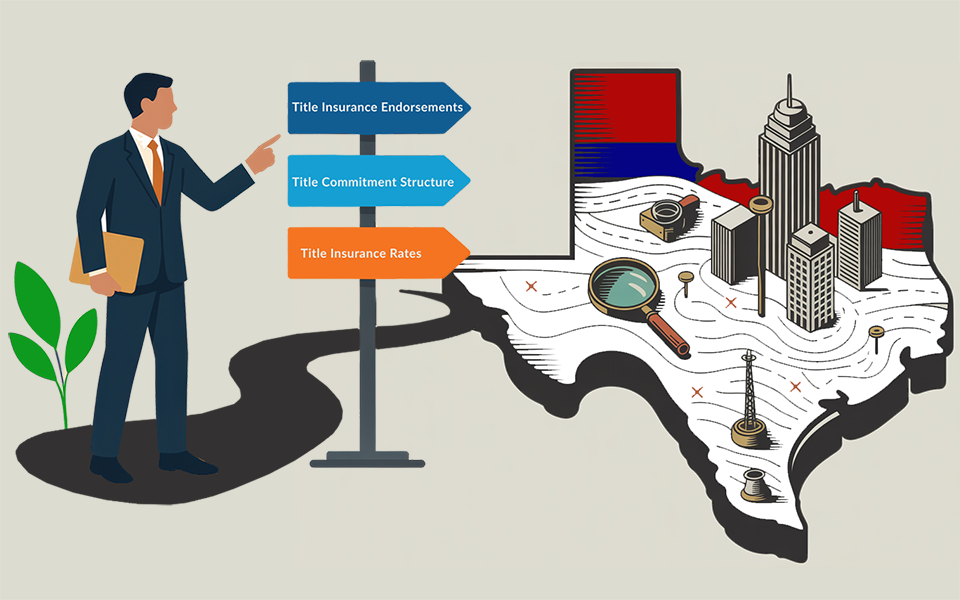FinCEN Compliance Reporting Services — Be Ready Before March 1, 2026 Learn More →
December 22, 2025
Elevating Your Title Company to New Heights - A Blueprint for Growth

Let's be honest – growing a title company isn't what it used to be. Gone are the days when simply maintaining the status quo was enough to succeed. In today's dynamic real estate market, standing still essentially means falling behind. But here's the good news: there's never been a better time for strategic growth in the title industry.
Recent data from the American Land Title Association shows that title insurance premium volume hit $27.3 billion in 2023, demonstrating significant market opportunity despite market fluctuations. Yet, many title companies struggle to capture their share of this growth. Why? Often, it's not for lack of trying, but rather the absence of a comprehensive growth strategy.
Building Strong Foundations
Success in the title industry starts with rock-solid operations. Think of your operational framework as the foundation of a house – everything else builds upon it. The most successful title companies we've worked with at Skyline all share one common trait: they're ruthlessly efficient in their core processes.
Start by mapping out your workflow from order intake to closing. Where are the bottlenecks? Which processes eat up the most time? Through our years of experience in the industry, we've seen that companies who outsource certain time-intensive tasks to qualified title support services can free up valuable resources for growth initiatives.
Your team is equally crucial to this foundation. The title industry faces a unique challenge: the average age of title professionals is increasing, with 30% of workforce expected to retire within the next five years. This means investing in training programs isn't just good practice – it's essential for survival. Our most successful partners have implemented mentorship programs where experienced staff can pass on their knowledge to newer team members.
Embracing Technology & Innovation
In our work with title companies across the country, we've observed one clear differentiator between thriving companies and those merely surviving: their approach to technology. But here's the catch – it's not about having the newest toys. It's about having the right tools that actually solve your problems.
Your tech stack should include:
• A robust title production platform
• Secure document management system
• Integration capabilities with major closing platforms
• Automated communication tools
Here's a surprising statistic: title companies that invested in automation tools during 2023 reported a 35% increase in processing efficiency. That's not just a number – it's real time and money saved.

Smart Financial Planning & ROI
Growing your title company requires investment, but throwing money at problems isn't the answer. Smart growth requires smart spending. Based on our industry experience, we recommend creating a growth budget that allocates resources across three key areas:
• Technology infrastructure (25-30%)
• Marketing and business development (20-25%)
• Team development and training (15-20%)
Track your ROI meticulously. Successful title companies typically aim for a revenue-per-employee benchmark of $150,000 to $200,000 annually. If you're falling short, it's time to reassess your operational efficiency.
Understanding Your Competitive Landscape
In today's market, your competition isn't just the title company down the street – it's every company that can serve your market digitally. We recommend conducting a thorough SWOT analysis of your business, but don't stop there. Mystery shop your competitors. What are they doing better? Where are they falling short?
Identify your unique value proposition. Maybe it's your local expertise, perhaps it's your technology integration, or it could be your exceptional customer service. Whatever it is, make sure it's something your market actually values.
Managing Risk in a Growing Operation
Growth without proper risk management is like driving a sports car without brakes – exciting until it goes wrong. As your operation expands, so do your risk exposure points. At Skyline, we've seen the most successful companies implement a multi-layered risk management strategy that includes:
• Regular compliance audits
• Cybersecurity protocols
• Quality control checkpoints
• Professional liability coverage
Recent industry data shows that title companies with documented risk management procedures experience 40% fewer claims than those without such protocols.
Client Acquisition & Retention Strategies
Growing your client base isn't just about marketing – it's about creating a sustainable ecosystem of referrals and repeat business. Through our partnerships with successful title companies, we've observed that maintaining a closing ratio of at least 80% with their core client base is key. How? By treating every transaction as the beginning of a relationship, not the end of a deal.
Develop a marketing strategy that focuses on:
• Educational content for real estate professionals
• Regular market updates for your client base
• Strategic social media presence
• Community involvement
Remember, it costs five times more to acquire a new client than to retain an existing one. Make client retention a priority by implementing regular check-ins and feedback systems.
Looking Ahead
The title industry is evolving rapidly, and the companies that will thrive are those that can adapt while maintaining their core strengths. Start implementing these strategies incrementally – you don't need to transform everything overnight. Focus on one area at a time, measure your results, and adjust as needed.
Remember, growth isn't just about getting bigger – it's about getting better. Every step you take toward improving your operations, technology, and client relationships is a step toward sustainable growth.
Ready to start your growth journey? Begin by assessing your current operations against the benchmarks mentioned in this article. Identify your biggest opportunities for improvement, and create an action plan to address them. The future of the title industry belongs to those who prepare for it today.
Related Posts
Title Acceptance Pilot Explained for Title & Settlement Teams
A practical guide to the Title Acceptance pilot, covering eligibility, workflow changes, risk controls, and what title teams must document and protect.
February 26, 2026
The Hidden Costs of FinCEN Non-Compliance: Why Waiting Until March Could Cost Your Title Company Thousands
It's March 15, 2026. Your closer just wrapped a cash-to-LLC transaction. A straightforward deal, nothing unusual. Then someone on the team asks ...
February 26, 2026
How to Read a Title Commitment: 12 Exceptions That Scare Buyers (But Don’t Always Kill the Deal)
If you have ever opened a title commitment and felt your stomach drop when you hit the exceptions, you are not alone. Buyers often see a long ....
January 31, 2026
2026 Title Industry Outlook: Top 10 Trends That Will Redefine Due Diligence and Closings
The title industry is heading into 2026 with more moving parts than at any time in recent memory: rapid regulatory change, deeper fraud risk ...
December 22, 2025
Beyond the Basics: Navigating Title Complexity in Texas Commercial Real Estate
Last spring, a Dallas investor was three days from closing on a mixed-use development site when the title examiner discovered something unusual ...
December 22, 2025
Witchy Titles & Cursed Closings: What Salem’s History Can Teach Us About Real Estate Due Diligence
In 1692, the town of Salem, Massachusetts descended into chaos. Fueled by fear, rumors, and suspicion, dozens of people were accused of witchcraft and ...
December 22, 2025
Title Under Siege: A First Look at Our New Guide to Deed Fraud and Seller Impersonation
Seller impersonation, in particular, is on the rise. In these cases, a scammer poses as the property owner—usually targeting vacant land, rental...
December 22, 2025
Real Estate Due Diligence Checklist: 9 Hidden Costs That Kill Closings
Imagine this: A $3.2 million Miami Beach home sale implodes because of a $127 unpaid utility lien that no one caught in time. Absurd as it sounds ...
December 22, 2025
Land Surveys vs. Title Searches: When You Need Both (and How to Budget)
Picture this: you’re days away from closing on a home when an unexpected hiccup surfaces. The seller’s old fence sits two feet inside the neighbor’s...
December 22, 2025
Top 10 Municipal Red Flags That Can Delay Your Closing (and How to Fix Them)
Real-estate contracts are filled with dates, deposits, and delivery deadlines. Yet even when buyers, sellers, and lenders stay on schedule ...
December 22, 2025
How Can Large Title Companies Thrive in Volatile Times?
When mortgage rates climbed to 23-year highs in late 2023, one national title insurer watched transaction volume plummet 45% over eight weeks yet ...
December 22, 2025
Summer Real Estate: Keep Closings Cool When the Market Heats Up
Summer signals one of the busiest times in real estate, especially in Florida, as well as in fast-growing markets like Texas, Arizona, and ...
December 22, 2025
Navigating Florida’s Title Regulations for Small Title Agencies
Running a small to mid-sized title agency in Florida can feel like juggling flaming torches—there’s licensing, escrow accounting, audits, data security ...
December 22, 2025
Top Mistakes When Ordering a UCC Search
UCC Searches are crucial in risk assessment and due diligence in commercial lending and secured transactions. Yet despite their importance, we have ...
December 22, 2025
The Title Pro's AI Companion: Using Skyline's SmartTitle Assistant
How much time did you spend drafting repetitive client emails today? Our average title professional saves 5+ hours weekly using SmartTitle Assistant™ ...
December 22, 2025
UCC Search vs. Title Search: What's the Difference — and Do You Need Both?
In the complex world of real estate transactions, due diligence is everything. Whether you're a lender evaluating a loan application, an investor ...
December 22, 2025
Navigating Market Volatility: What Title Professionals Need to Know Now — and What's Ahead in 2025
In today's real estate landscape, the only constant is change. Fluctuating interest rates, economic uncertainty, and shifting regulatory policies have ...
December 22, 2025
What Happens if a Satisfaction of Mortgage is Not Properly Recorded?
Paying off a mortgage is a significant financial milestone, but the process isn’t complete until the lender records the mortgage satisfaction with the ...
December 22, 2025
Generating New Business for Title Companies in a Competitive Market
The title industry is transforming. Increased competition, technological advancements, and shifting consumer expectations are challenging traditional ...
December 22, 2025
Spring Cleaning for Your Property Title: How to Refresh Your Real Estate Records
Millions of real estate transactions are delayed or fall apart each year due to title issues that could have been prevented. In fact, a recent study ...
December 22, 2025
Top Strategies to Prevent Quiet Title Issues
Quiet title disputes are a serious concern for real estate professionals, as they can disrupt transactions and create uncertainty around property ownership ...
December 22, 2025
Title Services for New Construction: What Builders and Developers Need to Know
The construction of a new home or commercial property is an exciting and ambitious project, but it comes with more than just design and building ...
December 22, 2025
Will AI Agents Replace Title Professionals? The Truth About Automation
Artificial intelligence (AI) has evolved beyond simple data analytics and chatbots. Today's AI "agents" can interact with web browsers, gather and analyze ...
December 22, 2025
10 Reasons Why Skipping a Land Survey Can Be Costly
A land survey might seem like an unnecessary expense, especially if the property has been owned for years without any issues. However, skipping this step ...
December 22, 2025
Title Industry 2.0: Harnessing AI, Data, and Cybersecurity for a Resilient Future
The title industry is at a crossroads. Traditional methods that have served us well for decades now face mounting challenges in an increasingly ...
December 22, 2025
How Title Services Impact Mortgage Underwriting Timelines
In the world of real estate, the journey from application to closing is filled with numerous moving parts. Among these, title services are a crucial yet ...
December 22, 2025
How Title Companies Can Meet Tight Deadlines Without Sacrificing Quality
In today's fast-paced real estate environment, speed is crucial. Title companies often find themselves in high-pressure situations where they must juggle ...
December 22, 2025
5 New Year's Resolutions for Title Companies in 2025
As 2025 kicks off, the title industry is moving faster than ever. With new technologies, shifting customer needs, and more complex regulations, there’s ...
December 22, 2025
How to Explain Title Insurance to Your Clients: A Real Estate Agent's Guide
Explaining title insurance isn't always straightforward, but with the right approach, it can become a valuable teaching moment for your clients. Picture this ..
December 22, 2025
The Hidden Complexities of Property Title Searches
You've found your dream home. The price is right, the location is perfect, and you're ready to sign on the dotted line. But before you do ...
December 22, 2025
What’s Next for the Title Industry? Key Trends for 2025
The title industry is at a pivotal moment, with 2025 shaping up to be a year of significant transformation. From groundbreaking technologies like blockchain ...
December 22, 2025
Commercial Property Title Due Diligence: Going Beyond the Basics
The landscape of commercial property title due diligence has transformed dramatically over the past three decades. Gone are the days when a basic title ...
December 22, 2025
Beyond the Standard Search: Advanced Commercial Title Due Diligence in Florida
Last month in South Florida, a seasoned commercial real estate investor nearly walked away from a $12 million mixed-use development purchase ...
December 22, 2025
Navigating the Cyber Minefield: A Title Professional's Complete Guide to Phishing Defense
The title industry is a prime target for cybercriminals, and phishing is one of the most common threats that title professionals face today. Imagine this ...
December 22, 2025
This Halloween Avoid Real Estate Nightmares: 5 Spooky Title Issues That Can Haunt You
Buying a new home is exciting, but not all surprises are welcome. Some title issues can be like ghostly figures lurking in the shadows ...
December 22, 2025
How to Overcome Common Title Operations Challenges and Boost Efficiency
Running a title company means you’re a key player in the real estate world, making sure property transactions go smoothly and securely. But, we get it ....
December 22, 2025
🎙️QuickCast: Future Trends in the Title Industry.
The title industry, like many others, is undergoing significant transformation due to technological advancements. While some of these changes ...
December 22, 2025
Understanding Municipal Lien Searches: A Complete Guide
Imagine this scenario: You've discovered an incredible property, yet as the closing date approaches, an unsettling surprise reveals itself—a municipal lien...
December 22, 2025
Wire Fraud : Proven Defense Tactics for Title Professionals
Wire fraud is a rapidly growing threat in the real estate industry, with fraudsters becoming more sophisticated and aggressive in their ...
December 22, 2025
Preparing for August 17th: Essential Information on the NAR Broker Commission Changes
The real estate market is about to undergo significant changes as new commission regulations take effect on August 17. These changes ...
December 22, 2025
Maximize Efficiency in Your Title Business with AI
Integrating AI into title businesses can significantly enhance efficiency, accuracy, and customer service. By automating routine tasks, improving...
December 22, 2025
The Importance of Land Surveys in Property Transactions: What You Need to Know
Boundary surveys are essential in property transactions to accurately define property lines, identify encroachments, and resolve disputes. Conducted ...
December 22, 2025
Summer Selling Season: Essential Steps for Real Estate Pros to Ensure Smooth Transactions
Essential steps for real estate professionals to ensure smooth transactions during the bustling summer selling season include preparing properties, ...
December 22, 2025
Recent Posts




















































.png)

